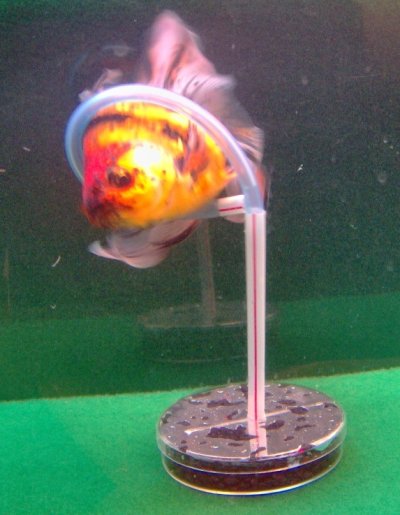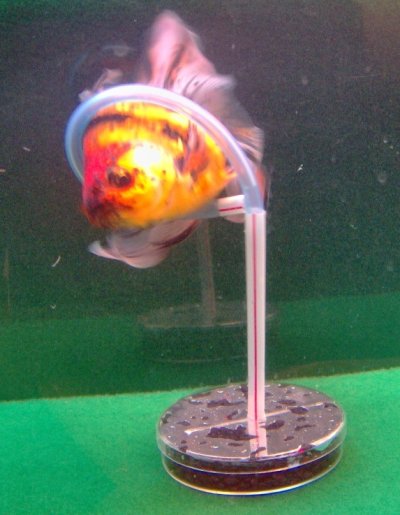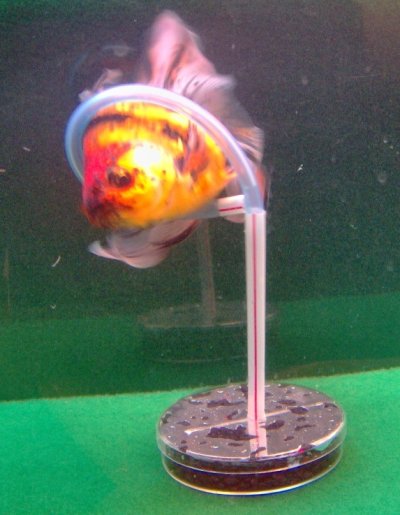FishTrainerGuy
Aquarium Advice Apprentice
About 8 months ago, my 9-year old son won two goldfish at a school fair. After watching them for a while, it was apparent that there is something going on in their little minds. Ever since then I've been fascinated by fish intelligence. After a little research, I discovered there is quite a bit of scientific evidence that fish are smarter than people give them credit for.
So about six months ago, on a whim, we purchased a handsome calico fantail goldfish. We named him Albert (short for Albert Einstein), and set about to see what we could teach him. Long story short, he has proven to be a remarkable student in "fish school", and has learned to perform what I consider to be some pretty impressive behaviors.
For starters, he will eat directly from my hand - a simple behavior but one I find strangely gratifying. It gives me a feeling of being much more connected to him - more like the feeling a cat or dog owner experiences I suspect.
More impressive, Albert has learned to swim through a hoop and a tunnel several times as long as his body. Their diameter is not much bigger than his body, so he has to turn on his side and tuck in his fins to squeeze through. It is really amusing to watch! Albert can even push a soccer ball into a goal, and push a football "down field" and across a goal line. No joking. He has learned it all through positive reinforcement and shaping. We've given him small bits of food reward whenever his actions even approximate the desired behavior. Over time we've been able to shape his behavior into some pretty cool tricks.
My son and I have been so intrigued and excited by Albert's success that we've set up a web site devoted to fish intelligence and training. If you want to be amused, check out these photos and videos of Albert doing his tricks:
http://www.fish-school.com/gallery.htm
For anyone still skeptical, we even have a live wabcam on Albert's "show tank." At certain times of day, you can watch me putting Albert through his paces:
http://fishschool.ww.com
I'd love feedback from people on their experiences with fish intelligence and training.
Do you have fish that show signs of intelligence? Have you trained them to do anything interesting?
What species seem most intelligent?
Do you know of other evidence for fish intelligence? I found a bunch of links to articles and scientific studies on fish intelligence, which I've listed here http://www.fish-school.com/intelligence.htm. Do you know of others?
Please don't bother to tell me I've got too much time on my hands and/or "get a life." I hear this enough from my wife . I figure if nothing else, these efforts have been a worthwhile learning experience and a great bonding opportunity for my son and me!
. I figure if nothing else, these efforts have been a worthwhile learning experience and a great bonding opportunity for my son and me!
Dean Pomerleau
Pittsburgh, PA
So about six months ago, on a whim, we purchased a handsome calico fantail goldfish. We named him Albert (short for Albert Einstein), and set about to see what we could teach him. Long story short, he has proven to be a remarkable student in "fish school", and has learned to perform what I consider to be some pretty impressive behaviors.
For starters, he will eat directly from my hand - a simple behavior but one I find strangely gratifying. It gives me a feeling of being much more connected to him - more like the feeling a cat or dog owner experiences I suspect.
More impressive, Albert has learned to swim through a hoop and a tunnel several times as long as his body. Their diameter is not much bigger than his body, so he has to turn on his side and tuck in his fins to squeeze through. It is really amusing to watch! Albert can even push a soccer ball into a goal, and push a football "down field" and across a goal line. No joking. He has learned it all through positive reinforcement and shaping. We've given him small bits of food reward whenever his actions even approximate the desired behavior. Over time we've been able to shape his behavior into some pretty cool tricks.
My son and I have been so intrigued and excited by Albert's success that we've set up a web site devoted to fish intelligence and training. If you want to be amused, check out these photos and videos of Albert doing his tricks:
http://www.fish-school.com/gallery.htm
For anyone still skeptical, we even have a live wabcam on Albert's "show tank." At certain times of day, you can watch me putting Albert through his paces:
http://fishschool.ww.com
I'd love feedback from people on their experiences with fish intelligence and training.
Do you have fish that show signs of intelligence? Have you trained them to do anything interesting?
What species seem most intelligent?
Do you know of other evidence for fish intelligence? I found a bunch of links to articles and scientific studies on fish intelligence, which I've listed here http://www.fish-school.com/intelligence.htm. Do you know of others?
Please don't bother to tell me I've got too much time on my hands and/or "get a life." I hear this enough from my wife
Dean Pomerleau
Pittsburgh, PA



